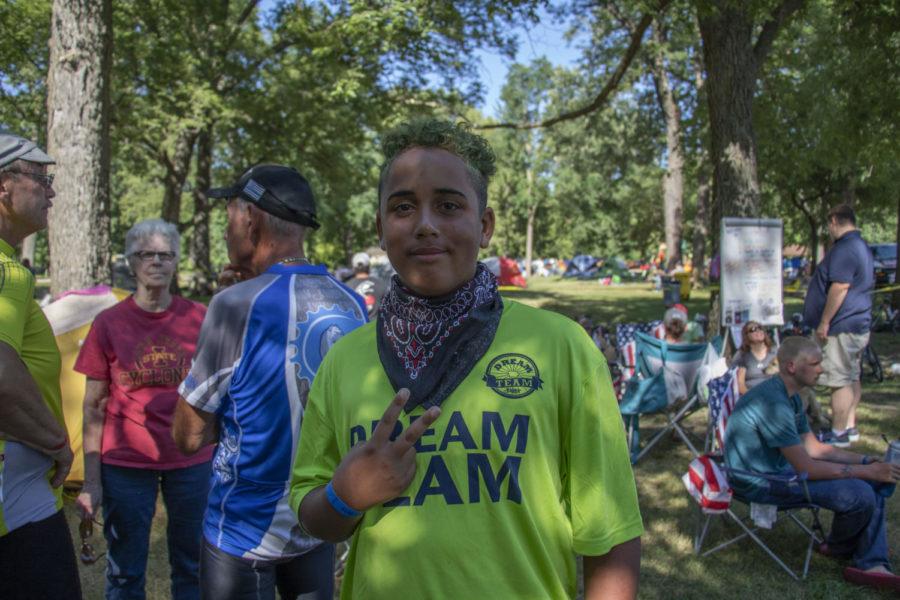Dream Team program helps under-privileged kids ride RAGBRAI
July 24, 2018
RAGBRAI can be a time when people from all walks of life come together and cycle across Iowa, but what if you don’t have a bike?
The Dream Team program aims to help students from under-privileged and under-represented communities in the Des Moines metro area by training them, preparing them for RAGBRAI and providing communication and leadership experience while giving those who finish the bike ride a bike of their own.
The program, which started in 1996, currently serves 65 students.
“We work with these kids aged 13 through actual high school graduates, and get them ready to ride RAGBRAI,” said Kittie Weston-Knauer, one of 30 staff members and mentors working with the Dream team. “I would say it is more than just getting them ready for the physical aspect of RAGBRAI. It has a lot to do with the team work, a lot to do with communicating with others.”
Lorenzo Hill, a 13-year-old in the program, explained what the program does and how it works.
“Children around central Iowa who don’t go outside much, who don’t bike or don’t have a bike of their own are loaned a bike the first year,” Hill said. “The bikes are given to them if they are able to finish the race. As a first year myself, I was able to make the 1000 mile mark in training, which is the distance they want everyone to reach.”
These trainings start out at 75 miles a week, which Hill said was easy. Eventually, however, the trainings ramped up to 100 miles a week and, finally, 150 miles a week. In between these intervals, there were scheduled campouts.
The campouts consisted of trips to Boone, Jefferson and Panora. Students who went to Panora did so over a three day period and biked there from Des Moines, which is 50 miles away.
Weston-Knauer explained how the trainings and activities can help the kids.
“You don’t necessarily know people when you join and we talk about life skills, and the types of skills that will enable you to be successful, whether it be in the classroom or in the world,” Weston-Knauer said.
These life skills are why Weston-Knauer said some students decide to come back year after year.
“After the first year we don’t give them another bike,” Weston-Knauer said. “So we are asked why in world would these kids come back, and it’s because of the skills they learn.”
These young cyclists have many reasons for returning, like Marissa Trees, a second time participant in the program and resident of Granger, Iowa, who said it improved her social skills.
“I have done the program twice now, so this is my second RAGBRAI,” Trees said. “Last year I was very shy and now I have improved that a lot. I made a bunch of friends and opened up.”
Trees said she would like to do the program again next year, explaining her favorite part.
“By the end of RAGBRAI everyone is very close and basically like a second family,” Trees said.
Hill said the program has helped him develop skills, build friendships, get fit and have a good time. While he will be moving to Florida next year, he said he would miss the program and wishes he could continue doing it.
“It is honestly really fun and honestly more people should do it because it takes a lot of determination and motivation,” Hill said.
Weston-Knauer said seeing student come back year after year can be one of her favorite parts of the program.
We get to see those kids developing from one year to the next because they were working and they were learning from this experience all of those years.”
These skills can be important for students as some of them face troubles at home.
“These kids come from many walks of life,” Weston-Knauer said. “They have many challenges that we might take for granted. As a result, they are learning they can overcome those challenges.”
“We are talking about kids who come from poverty, who come from broken homes, who might not be as successful as you or me in the classroom, but they get help and someone who shows them how to master those challenges,” Weston-Knauer added.
If one of the students decides to not complete RAGBRAI, they won’t receive the bike, but Weston-Knauer says she does everything in her power to make sure a student finishes the trip.
“Of the two students I mentor, I keep in touch with their parents because I want to make sure that student starts at the Missouri River and ends at the Mississippi,” Weston-Knauer said.







